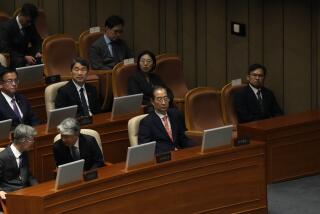Talks between two Koreas stall before they even start
- Share via
SEOUL — The two Koreas were all set to hold a face-to-face sit-down Tuesday, their first since conservative South Korean President Lee Myung-bak took office in February 2008.
Delegates from both sides were on hand, but the talks stalled early on when no one could agree on a venue for their discussion.
Finally, nearly 12 hours after they were scheduled to begin, the two sides met late Tuesday for just 22 minutes, with the North refusing to even discuss the release of a detained South Korean worker.
The meeting was scheduled at a jointly operated factory complex just north of the demilitarized zone, where Seoul says North Korean soldiers detained the worker last month.
The breakdown started soon after a delegation of nine representatives from Seoul crossed the border about 8:45 a.m. and headed toward the Kaesong industrial complex, where North Korean employees work at scores of South Korean-owned factories.
Seoul wanted to discuss the worker’s return, but apparently the government in Pyongyang, North Korea’s capital, was seeking to discuss the future of the troubled joint venture.
North Korean officials also insisted that the conclave take place at their administrative office in Kaesong, not the management office that oversees the joint venture, South Korea’s Yonhap news service reported.
North Korea won at least one victory Tuesday: The talks were held in the area of the complex under its control.
One analyst said the South Korean government might have misinterpreted a message from the North over the weekend as saying that officials from the reclusive communist regime were ready to meet.
“South Korea thinks ‘Well, let’s meet them. We’ll not only hear what North Korea will say to us, we can tell them what we have in our mind,’ ” said Yang Moo-jin, a professor at the University of North Korean Studies in Seoul.
“But North Korea goes: ‘What are you talking about? This is just a notification, not a negotiation.’ It’s a ki fight between the two,” Yang said, using a term that refers to the flow of energy.
Officials from Seoul’s Unification Ministry said Tuesday that the two sides had disagreed “about the process” for the talks.
The apparent miscommunication evinced the strained atmosphere between the two sides after Pyongyang’s recent threat to restart its nuclear program.
Tensions between the two neighbors peaked this month when North Korea launched a rocket, saying it was putting a satellite into orbit. The U.S. and its allies said no satellite reached space, and many observers believe the mission was actually a test of a long-range ballistic missile.
After Japan, the U.S. and South Korea sought penalties for Pyongyang through the United Nations Security Council, North Korea announced that it would withdraw from the six-party talks aimed at its nuclear disarmament.
The Pyongyang government later expelled international monitors from its chief nuclear facility.
North Korea has also warned against the South’s possible participation in the Proliferation Security Initiative, which it would regard as a “declaration of war.” The initiative, proposed by the Bush administration in 2003, is aimed in part at preventing North Korea from selling nuclear weapons.
Seoul has demanded that the worker be released. Officials say he has been held since March 30, when he allegedly criticized the secretive regime and encouraged North Koreans to defect.
“It is completely hard to understand that North Korea rejected a talk on the matter of the South Korean worker,” Seoul’s Unification Ministry said after the meeting.
North Korea is also holding two American journalists who it says were spying on the reclusive regime. The two were taken into custody March 17 near the Chinese border while filming a documentary about North Korean defectors.
--
Ju-min Park of The Times’ Seoul Bureau contributed to this report.
More to Read
Sign up for Essential California
The most important California stories and recommendations in your inbox every morning.
You may occasionally receive promotional content from the Los Angeles Times.











